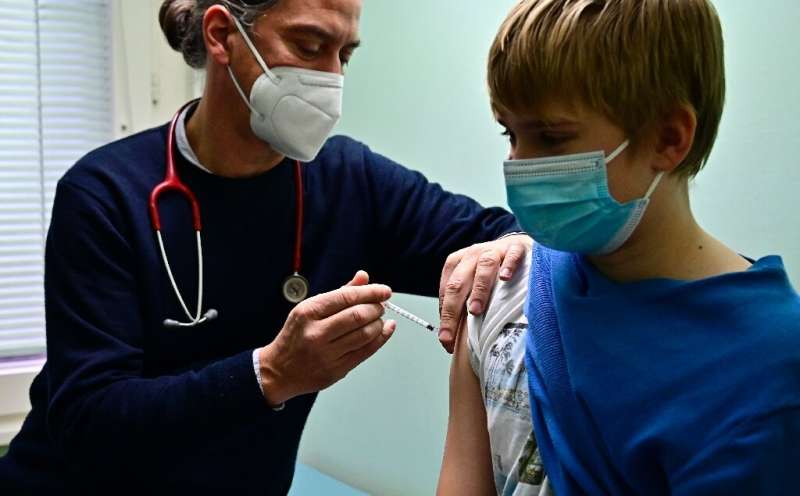
Several European nations started vaccinating children aged five to 11 against COVID-19 on Wednesday in an effort to contain a raging pandemic and keep schools open, while others are still deciding their approach.
Germany, Spain, Greece and Hungary were among those opening up their inoculation drives to younger kids, with doctors reporting strong initial demand from parents amid concerns about the fast-spreading Omicron variant.
Greek Education Minister Niki Kerameus was among the first to arrive at an Athens hospital to have her young son vaccinated, state TV ERT reported.
The country has so far registered more than 30,000 vaccine appointments for kids.
The EU’s medicines watchdog last month approved the Pfizer-BioNTech shot for five to 11-year-olds, an age group experiencing high coronavirus infection rates across the continent.
The vaccine is administered in a lower dosage than the Pfizer jab for over-12s, and comes in a paediatric vial with an orange cap to distinguish it from the purple-capped vials for older ages.
Denmark, which has seen a surge in cases attributed to the new Omicron variant, and some Austrian regions already began offering jabs to younger kids in November.
The United States was the first large country to take the plunge and has so far vaccinated more than five million children in the 5-11 age bracket.
‘Small cog’
“As soon as we offered the vaccine appointments, they were pretty much all snapped up,” said Jakob Maske, a Berlin-based doctor and spokesman for Germany’s association of paediatricians.
But he downplayed expectations of the kids’ jabs heralding a turning point in the fight against COVID-19, at a time when Germany is battling a fierce fourth wave.
“Five to 11-year-olds only make up around three percent of the German population,” he told AFP, describing the kids’ immunisation impact as “a small cog” in the battle.
Germany’s STIKO vaccine commission has officially only recommended the jab for children with pre-existing conditions, but even healthy children will be inoculated if the parents request it.

Some German cities plan to administer kids’ jabs in museums and zoos, while others are mulling mobile vaccination teams outside schools.
The head of Germany’s teachers’ association, Heinz-Peter Meidinger, said a high take-up “would significantly increase the chance of keeping schools open as long as possible”.
But like other countries, Germany also grapples with anti-vaccine militancy and Wednesday saw police in the eastern city of Dresden stage raids over death threats against a pro-vaccine public official.
Spain, which has one of Europe’s highest COVID-19 vaccination rates, said it was launching its immunisation campaign for five to 11-year-olds with the goal of breaking the chain of infection “in family settings, schools and the community”.
The country has around 3.3 million children within that age group.
A survey published by Appinio found that 74 percent of Spanish parents of five to 11-year-olds wanted to get their kids jabbed.
Hoping to spur take-up, the Spanish government has released a television commercial showing kids getting the shot so they can “help end the virus and protect the elderly”.
More countries following
A number of European countries will launch similar vaccination drives in the coming days, including Italy, Portugal, Poland, the Baltic states and the Czech Republic, while others are still finalising their plans.
In France, vaccination has only been approved for five to 11-year-olds at risk of developing serious illness, but the government has said it is considering extending it to all children on a voluntary basis.
Cyprus will begin vaccinating children aged 5 to 11 from Thursday, after Health Minister Michalis Hadjipantela spoke of the “anguish” around the world over “the difficult days we are experiencing”.
Belgium is awaiting the recommendation of its national health body, with a rollout likely around the new year.
In Switzerland, the country’s medical agency has greenlighted the vaccination of kids, but the campaign itself will probably only start in early January.
Source: Read Full Article
